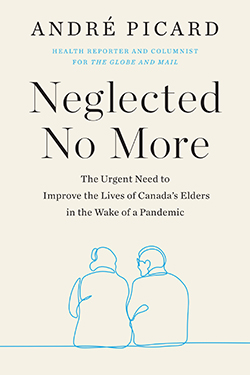By Dan Rubinstein
At the end of April 2021, a 322-page report released by Ontario’s Long-Term Care COVID-19 Commission detailed an array of festering challenges—including persistent underfunding, severe staffing shortages, outdated infrastructure and poor oversight—that “contributed to deadly consequences for the province’s most vulnerable citizens during the pandemic.”

André Picard
These problems, endemic across Canada in every type of eldercare, are not news to André Picard, the award-winning Globe and Mail health reporter and columnist whose writing has helped keep Canadians informed throughout the biggest public health crisis in a century.
In fact, the Carleton University journalism school alumnus and honorary degree recipient has been covering issues associated with aging since starting at the national newspaper immediately after graduating 34 years ago.
“What lies do we have to tell ourselves to justify how senior citizens are treated?” asks Picard, whose fifth book, Neglected No More: The Urgent Need to Improve the Lives of Canada’s Elders in the Wake of a Pandemic, was published in March.
“We don’t have to make the choices that we’ve been making,” he says. “The state of eldercare is one of the chronic holes in our medicare system, and the number of elders who have died so horribly is the most obvious tragedy that’s occurred because of COVID-19 in Canada.”
Nearly 70 per cent of all deaths in the country during the pandemic have been in nursing homes, according to a recent report from the Canadian Institute for Health Information. The international average is just over 40 per cent.
Despite countless inquiries that have called for eldercare reform, politicians have been “far more eager to order investigations than act on the problems that have been exposed,” Picard writes in Neglected No More, which he describes as a “rough blueprint” for change.
“In Canadian health care, it seems, no screw-up, no matter how big or small, how sickening or deadly, is ever anyone’s fault. It’s always the fault of ‘the system.’ So, let’s fix the damn system.”

No Quick End to Restrictions
In March 2020, Picard had been watching COVID-19 spread from China to Iran, Italy and the United States and, as a de facto health historian who covered the 2003 SARS outbreak, he understood that its arrival in Canada was imminent and inevitable.

Neglected No More
“The pandemic is an intersection of so many things that I’ve written about for so many years: infectious diseases, the social determinants of health, race, class, politics,” says Picard, noting that while Canada learned a lot from SARS, we remained arrogant about our ability to withstand the new coronavirus.
“In a sense, it’s an amazing time to be a journalist because our craft is in the spotlight and is more needed than at any point over the past 100 years.”
Now that vaccine rollouts are accelerating, Picard’s prediction, shared in an early January column, is that the pandemic will end not with a Hollywood-like moment of triumph, but will peter out with a whimper.
Masks, distancing and travel restrictions will be with us for the foreseeable future. The “durability of immunity” remains a question. Variants will trigger cascading waves of illness around the world. And the economic and mental health fallout, especially among low-paid workers and other marginalized communities, will spark crucial social and political conversations and decisions.
The pandemic will also serve as a wake-up call for the need to urgently fix the eldercare system in Canada, Picard hopes.
“We know that the solution starts with valuing quality of life for seniors, asking how people want to live, not where they want to spend their final years, and enhanced home care that makes it easier for elders to remain in their communities, as well as addressing concerns such as funding, staffing and infrastructure in retirement and long-term care homes.
“If we don’t learn from this,” says Picard, trailing off. “A pandemic is a terrible thing to waste.”

Baby Boomers Will Demand Change
Despite the scale and complexity of the eldercare challenge, Picard is optimistic. The huge (and affluent) aging cohort of baby boomers has already reshaped our cities and education system and will demand change.
“I’m not naïve,” he says. “I don’t think we’re going to resolve all of the inequities that the pandemic has exposed. But I think we’ll improve eldercare. There are no political downsides or barriers, other than our willingness. Everybody loves their grandmother.”
In addition to reading, writing and spending too much time on Twitter these days, Picard is also a visiting professor at the UBC School of Journalism, Writing and Media.
He learned the fundamentals of reporting from industry veterans while studying at Carleton and now he’s passing on that knowledge as a veteran himself.
But mostly, he’s focused on writing newspaper stories and columns—the type of journalism that’s vital to a healthy democracy.
“At the end of the day,” says Picard, “I’m still a daily grunt at heart.”

Friday, May 14, 2021 in Alumni, Community, Journalism and Communication
Share: Twitter, Facebook



